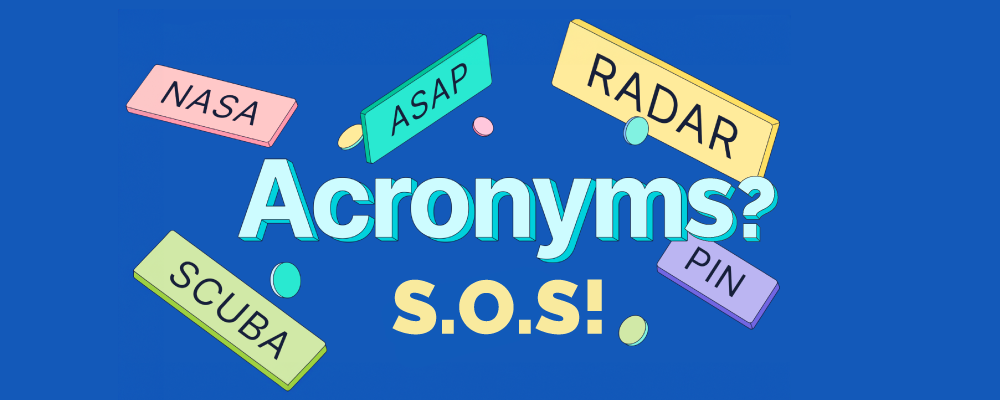Have you ever felt like you landed on a new planet where the inhabitants speak a secret code composed only of letters? Well, you’re not alone! Every day, we endure the bombardment of acronyms. It’s like being trapped in a perpetual crossword puzzle.
From technology to politics, acronyms, those word abbreviations, have shamelessly taken over most European languages. So, join me on a linguistic journey into the extravagant universe of acronyms, where just a few letters pretend to represent a lot… How audacious, my goodness!
Do you remember when words were just words? Well, that was before acronyms took over everything. This practice dates back many centuries, even in ancient Rome, for example. If you visit the Eternal City today, you’ll still find ruins with the engraved initials SPQR, which stands for Senatus Populus Que Romanum, the Senate and People of Rome. We also see the Roman acronym INRI on crucifixes, which stands for Iesus Nazarenus Rex Iudaeorum, Jesus of Nazareth, King of the Jews.
However, it is in modern times that this practice has become almost an obsession, especially in English-speaking countries, and it is now spreading to all European languages. English acronyms dominate social media because they abbreviate, synthesize, and entertain, even though they make language hermetic.

Excuse me the native English speakers, but this is for those like me who have English as second language… Acronyms like “LOL to express amusement or “WTF,” a rude way to express surprise or indignation. Then we have the popular ASAP, as soon as possible, to avoid the terrible word Urgent… and the triple O, Out of Office, an elegant way of saying that you’re not working. Other jargon that is successful in the business world includes FTF, the face-to-face interaction, BTW, by the way, or on another note, and the most important one for a salesperson: WTB, Want to Buy.
Moreover, acronyms are used profusely in politics and finance… and sometimes, unintentionally, they can be degrading. For example, the term PIGS became popular during the 2007 financial crisis to refer to the governments of Portugal, Italy, Greece, and Spain and their massive debt. Calling them PIGS was disrespectful and, of course, it sparked protests from the ambassadors in front of the Anglo-Saxon press that spread such an unfortunate acronym.
In the context of the language services industry to which we dedicate ourselves, we are often asked for translations in FIGS… which stands for French, Italian, German, and Spanish.
In technology, it’s not just usage, but abuse… to the point that acronyms have become almost an entirely new and therefore incomprehensible language, which is why the great Elon Musk says they should be banned!! For now, all we can do is scratch our heads and laugh at our inability to grasp them all.
Let’s take a moment… and look at the definition of acronym: an acronym is a word formed by combining the initial letters or syllables of multiple words. It provides a condensed and convenient way to refer to specific concepts or terms.
In a recent article by the Financial Times, it was written that Germany is experiencing an abbreviation mania named: “abkürzungsfimmel.” This word describes the excessive love for acronyms and makes sense in a language where words are so long that they seem to have been written without using the space bar. Whatever your area of interest or professional field, I assure you that you will have to turn to Saint Google to understand those acronyms that proliferate in the modern world.
Let’s see some examples of acronyms in various categories:
International Organizations: ONU, OMS, IMF, UNESCO, etc.
Government: CIA, FBI, NASA, etc.
Companies:
Brands: HP, LG, BMW
Songs: YMCA, SOS,
Movies: IT, IA,
Acronyms are used for various reasons
Conciseness and efficiency: Acronyms slim down language… by transforming long and heavy phrases into light and easy-to-swallow letters, communication becomes more agile.
Memorizing: Acronyms, especially if they are funny, are easier to remember than a series of long and formal words.
Attraction and sound: In the case of songs, brands, or movies, initials make titles livelier and more impactful.
Standardization: In international contexts, abbreviations can help a Chinese person communicate with a Mexican. “FIFA,” or “NASA” are understood even in Bhutan or Djibouti.
Security and anonymity: Acronyms can be used to conceal the true purpose or meaning of an organization or project, especially in military or governmental contexts. Do you remember KAOS from Get Smart?
So, acronyms are like a box of chocolates: you never know what you’re going to get. Although they can be fun and appealing, they can also become a barrier of exclusion. When someone starts throwing acronyms around like candies in a parade, those who are not familiar with them feel lost in translation. The key is to find a balance between the use of acronyms and clarity in communication. We cannot deny that acronyms can be very handy for simplifying and streamlining information, but they should not dominate our language because the goal is to connect and understand others.
If you want to combine the efficiency of acronyms with fun, create your own absurd acronyms, but be careful when spreading them, or you might not be understood. How about using “S.O.S.” for today’s meal? It stands for Spaghetti, Oregano, and Sauce. If you like it, refrain from using it at the restaurant.


